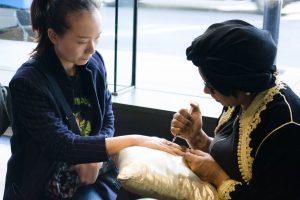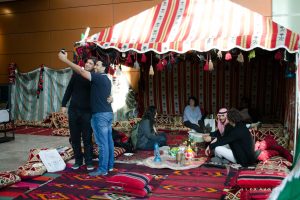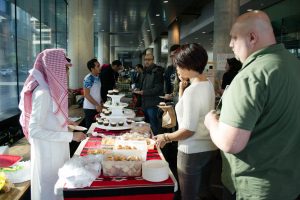The Montreal Saudi Student Association organized its second annual Saudi Exhibition
The Montreal Saudi Student Association held its second annual Saudi Exhibition on Nov. 14, in partnership with Concordia’s Saudi Student Association.
“Today’s event is about [promoting] Saudi culture,” said Sawsan Alshayeb, a volunteer and member of Concordia’s Saudi Student Association. “We want to showcase our culture… so people can see how [Saudis] really are and how we love our country, and [we] want to show it in a positive way so that people can enjoy it.”
The event was held in Concordia’s EV Building lobby, from 12 p.m. until 5 p.m., and attracted many curious eyes. In order to promote Saudi heritage, different kiosks were set up, each displaying an aspect of Saudi culture. Some kiosks offered attendees free food, most of which were typical Saudi delicacies.
The menu included traditional dishes like Saudi pastries and maamoun, which are small cakes. The large table also displayed cupcakes decorated with Montreal Saudi Student Association’s official logo.
Attendees could also buy honey, imported directly from the Asir province of Saudi Arabia. Other promotional products were offered, such as information brochures on various touristic regions of Saudi Arabia, as well as coffee mugs and other accessories.
A kiosk that caught the attention of many was the Arabic calligraphy kiosk, where many attendees, students and teachers alike, lined up to have their name written in Arabic by a professional calligrapher. The henna kiosk was also particularly popular.

The main point of attraction at the event, however, was the immense tent set up near the entrance of the EV building. Inside, The Concordian was welcomed by Mohammad Alhumaidhi, a student and volunteer at the event.
“That’s the actual tent [which] we go out [camping] with, in Saudi Arabia,” said Alhumaidhi, motioning to the heavy pieces of fabric enclosing the area around him. “We brought it from Saudi Arabia for this event specifically.”
The displayed tent was four meters long by four metres wide in size, the standard size for one of those traditional camping tents, said Alhumaidhi. He added that the fabrics that make up the tents differ, depending on the environment in which they were used. Thicker materials suit the colder mountainous regions of the country, whereas the thinner, fur-covered fabrics are more useful in the desert, where they can block the sandy winds.
In the tent, volunteers like Alhumaidhi were draped in a thobe, the traditional Saudi dress for men, and wearing a ghutra, a traditional headdress. Each of them welcomed curious students and Concordia teachers, teaching them about traditions of Saudi culture while sitting on one of the numerous decorated cushions that surrounded the area inside the tent. Attendees could learn about Arab coffee and tea, as well as traditional Arab music and singing.
For Alhumaidhi, the Saudi Exhibition is an extremely important event, and goes beyond simple promotion of his native country. “A lot of people hear about Saudi Arabia, and they don’t know [much] except for the image they see [in the media],” Alhumaidhi said. “They don’t know the real Saudi Arabia.”

“We [Saudis] live in houses, we drive cars. A lot of people think that we still ride horses in the streets. And I’m not joking at all. A lot of people are surprised that I drive a car,” he said. “Of course I do, it’s 2016!”
Preconceived ideas of Saudis and Arabs don’t just limit themselves to car driving. “I hear people come up to me and say, ‘Oh wow, you’re funny, you’re from Saudi Arabia, you’re Muslim—how is that possible?’ I’m a human being, I’m allowed to be funny,” said Alhumaidhi.
Indeed, representation of Arabs and Muslims in Western media is often negative, “depicting Muslims generally as violent, fanatical, bigoted, or as extremists and terrorists,” according to Belinda F. Espiritu in a paper published in Global Research in 2015. Espiritu is a researcher and an associate professor of communications at the University of the Philippines.
Espiritu said this negative image results in fear among the Western population—something Alhumaidhi has experienced himself.

“A lot of people get scared when they look at me wearing what I’m wearing right now,” he said, motioning to his traditional Saudi dress. “[If I’m] walking in the street, people move away from me. People literally move away from me, because they’re scared.”
Alhumaidhi believes such an event is necessary to eradicate this fear and inform people about real Arab culture.
“Saudis are not angry,” he said in a cheerful tone. “We smile, we love camping and singing, drinking coffee.”
Although this is only the second edition of the Saudi Exhibition, both the Montreal Saudi Student Association and Concordia’s Saudi Student Association are determined to keep up this annual event, in the hopes of teaching as many people as possible about Saudi culture.




